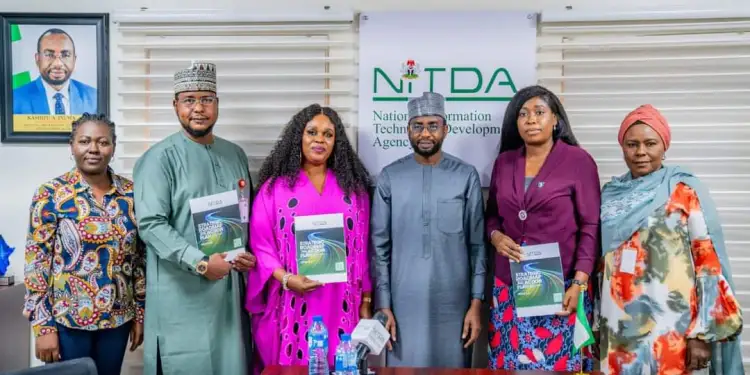In its ongoing effort to transform Nigeria into a globally recognized hub of technology and innovation, the National Information Technology Development Agency (NITDA) is set to collaborate with relevant organizations to effectively cascade the benefits of digital technology to all local governments across the country.
Collaboration and Vision
Kashifu Inuwa, the NITDA Director General, disclosed this during a meeting with the Senior Special Advisers to the President on Community Engagement for the South East, Chioma Nweze; South West, Ms. Moremi Ojudu; and North West, Abdallah Tanko Yakassai. The discussion focused on potential areas of collaboration in Nigeria’s digital transformation journey. This initiative aligns with the current administration’s priorities, especially in reforming the economy for sustained inclusive growth.
Alignment with Presidential Priorities
Inuwa highlighted the agency’s vision for fostering inclusive economic growth through technological innovation, which aligns with the president’s eight priority areas. These include:
- Reforming the economy to deliver sustained economic growth
- Strengthening national security for peace and prosperity
- Boosting agriculture to achieve food security
- Enhancing infrastructure and transportation as growth enablers
- Focusing on education, health, and social investment for development
- Accelerating diversification through digitization, industrialization, creative arts, and innovation
- Improving governance for effective service delivery to citizens
Strategic Roadmap and Action Plan (SRAP 2.0) 2024-2027
NITDA has crafted the SRAP 2.0, with its pillars serving as tools to help the President achieve his priority areas. One key pillar, “Foster Digital Literacy and Cultivate Talents,” emphasizes inclusivity. NITDA aims to achieve 95% digital literacy by 2030, with a mid-term target of 70% by 2027. The agency collaborates with the Ministry of Education to integrate digital literacy into academic curricula and develop standard training certifications necessary for government employment.
Digital Literacy and Training
NITDA has made digital literacy a prerequisite for government workers and developed initiatives for market people and artisans to use digital devices for internet banking and accessing government services. The agency uses various channels, such as TV programs, social media, radio, and roadshows, to deliver these initiatives. The 3 Million Tech Talent program, a collaboration between the Ministry of Communications, Innovation and Digital Economy and NITDA, aims to build youth capacity in high-demand skills. So far, over 30,000 individuals have been trained in the first phase, with the second phase currently underway.
Additional Strategic Pillars
Inuwa elaborated on the other seven strategic pillars:
- Building a robust technology research ecosystem
- Strengthening policy implementation and the legal framework
- Promoting inclusive access to digital infrastructure and services
- Strengthening cybersecurity and enhancing digital trust
- Nurturing an innovative and entrepreneurial ecosystem
- Forging strategic partnerships and collaborations
- Cultivating a vibrant organizational culture and an agile workforce in NITDA
He highlighted various infrastructures, innovative solutions, sponsorships, and training programs the government offers nationwide.
Grassroots Engagement
Yakassai appreciated the DG NITDA for his presentation and expressed his team’s willingness to collaborate with the agency in propagating its activities to the grassroots across the 774 local governments in the country. He emphasized that the President, being a grassroots-oriented leader, created this office to ensure government initiatives reach the grassroots level and that people understand the importance of NITDA’s programs and how they can participate.

